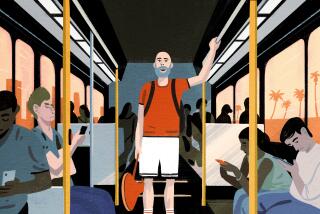Bus Rider Accuses N.Y. Line of Sex Bias : Religion: Sima Rabinovicz has been called “the Jewish Rosa Parks” for refusing to give up her seat for Orthodox men who wanted to pray apart from women.
- Share via
NEW YORK — Some have called her “the Jewish Rosa Parks”--a bus rider who refused, on principle, to give up her seat.
Sima Rabinovicz wouldn’t move to accommodate Orthodox Jewish passengers who wanted to pray apart from the women on the public bus they were riding from their suburban communities to their jobs in New York City.
She said one man told her if she didn’t move “they’d stone me till I bleed. There were like 20 of them, and I’m by myself. I was scared--upset and scared.”
Rabinovicz is demanding an end to segregation on the bus, and the director of the New York Civil Liberties Union is representing her in talks with lawyers for Monsey Trails, the bus company run by ultra-Orthodox Jews.
“If I talked to somebody, they told me, ‘Shut up, woman,’ ” she said. “The treatment of women always bothered me . . . like you were second-class.”
Monsey Trails is government-subsidized, and anyone can ride the bus. But the passengers are almost exclusively Orthodox and ultra-Orthodox Hasidic Jews who live in suburban enclaves formed in the 1950s by people who wanted to get away from the wanton ways of the city while keeping their jobs. Most work in Manhattan’s diamond and garment districts.
Rabinovicz, who is Jewish but not Orthodox, chafed at the centuries-old religious dictate observed by her fellow riders that men pray separately from women.
The men had hung a curtain, provided by the bus company, from the ceiling, down the center aisle. Men sat on one side, women on the other. But the men’s group was so large on Dec. 8, 1993, that they needed part of the women’s side too. As sunset approached, the men needed to begin evening prayers.
The group wanted Rabinovicz to move forward, where the rest of the women were seated.
Someone barked, “ ‘Move it!’--like I should obey,” Rabinovicz said. “I just ignored them.” The 10 or 15 other women, she said, cowered silently in the front. The bus stopped. Rabinovicz said the driver ordered her to move.
“I said, ‘Only if the cops come.’ He called the base and they said to move,” she said. She still refused.
Men “got off and literally prayed in the street,” said the bus firm’s lawyer, Kevin Hasson. “They were not just sent to the back of the bus, but kicked off the bus.”
The driver took her home. But then, said Rabinovicz, he “told me I shouldn’t take the bus any more.”
Norman Siegel, Rabinovicz’s lawyer, said he does not object to prayer on a bus, but to segregation abetted by a public carrier.
“You have conflicting principles that are significant and serious: religious freedom and practices, and sex discrimination,” he said.
Hasson said the bus line doesn’t discriminate by providing such things as the curtain, and it doesn’t care where passengers sit.
“Whoever owned the bus company, if 99% of passengers wanted the simple availability of a curtain, any good businessman would provide it to them,” Hasson said.
Hasson denied that the driver got involved in the disagreement, saying he stopped the bus merely because he was concerned about passenger safety.
Rabinovicz, 47, emigrated from Lithuania in 1972 with her husband and son, now 24. Their daughter, 12, was born in America.
In the Soviet Union, her family risked jail to bake matzo, unleavened bread used at Passover, she said. “In school, they called me names because we were Jews.”
Passengers waiting recently at a Monsey Trails bus stop in Manhattan had little sympathy.
“It’s not nice of the lady,” said Ben Zion-Meiar, a Hasidic Jew. “It’s only for the time they pray. They are just asking her for a favor.”
“She’s totally wrong. There’s no discrimination,” said Aaron Kraus, also Hasidic. “She wants a fight.”
More to Read
Sign up for Essential California
The most important California stories and recommendations in your inbox every morning.
You may occasionally receive promotional content from the Los Angeles Times.













